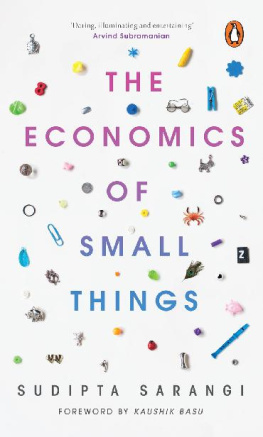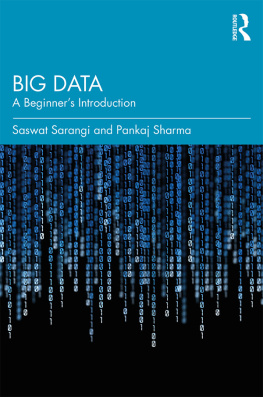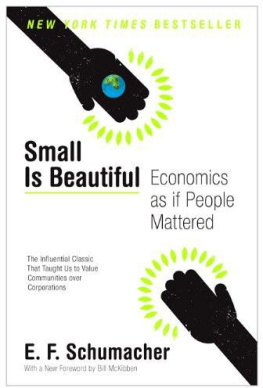SUDIPTA SARANGI
THE ECONOMICS OF SMALL THINGS
Foreword By Kaushik Basu
Contents
PENGUIN BOOKS
THE ECONOMICS OF SMALL THINGS
Sudipta Sarangi is a professor of economics at Virginia Tech. His research interests include networks, development economics and behavioural economics. He has been a consultant to the World Bank and the Food and Agriculture Organization of the United Nations, and serves on the editorial board of several journals. He enjoys teasing out economic insights from the little things in life. Currently, he hosts Coffee with the Chair , a virtual programme for undergraduate students at his university who are interested in all things economics. He grew up in Rourkela, which he remembers fondly and still loves to visit. He has lived in two of the most important cities in the worldDelhi, as a student before moving to the United States for his doctoral studies, and Washington DC, where he was a programme director at the National Science Foundation. He currently lives in Blacksburg, a small town nestled in the mountains of Southwest Virginia, with his wife, daughter and their dog Duffly. Among his favourite cities are Berlin in the summer, Paris all year round and Istanbul for its views and culinary delights. He also enjoys music, reading, writing and playing silly games with his daughter that they invent together.
Advance Praise for the Book
In this charming, magical book, Sarangi shows that economics matter in our daily life. In little things, in little livesin offering prayers, buying mangoes, watching movies, guarding shoes at the temple, wearing seatbelts. This book is economics as great entertainment!
Gurcharan Das, bestselling author and former CEO of Procter & Gamble India
Economists generally think of their audience as other economists. But in this book Sudipta Sarangi takes on the far more important task of explaining to a broader audience how the worldin all its everyday, quirky, rich detailcan be understood through the prism of economics. It is daring, illuminating and entertaining at the same time. And you can even find out whether Mahatma Gandhis complaint against the Indian Railways was economically well-founded.
Arvind Subramanian, former chief economic advisor to the Government of India and a non-resident fellow of the Peterson Institute of International Economics
In The Economics of Small Things , Sudipta Sarangi shows how a few simple principles of human behaviour can help us in understanding an extraordinarily diverse range of interesting phenomena in our day-to-day lives. He writes with humour and a lightness of touch that is remarkable. The book is perfectly pitchedenlightening and delightfully readable!
Sanjeev Goyal, professor of economics, University of Cambridge
Always wanted to know why the best Indian Alphonso mangoes seem affordable in American grocery stores but expensive in India? Or why India never had the proliferation of Blockbuster Video rentals like the US, instead had neighbourhood uncles renting out latest DVDs? Or why Indian drivers are loath to wear seat belts but quickly bow when passing a roadside temple? And what does all this have to do with complicated economic theories? Read Sudipta Sarangis delightful book to find out.
Ashwini Deshpande, professor of economics, Ashoka University
For my parents,
Chandraparva and Arabinda Sarangi
Foreword
E conomists are generally preoccupied with big questions a nations economic growth, sustainable development, recessions, inflations, job gains and job losses. Perhaps that is how it should be; those are concerns with major implications for society and human well-being. But economics as a discipline also impinges on and interacts with our everyday lives, in ways that we are unaware of most of the time. Many of the social norms and cultural practices of societies across the world that evolved over the years are such a part and parcel of life that we are not conscious of their existence. Yet many of these norms and institutions play a crucial role in making our economy viable. And, further, the laws of economics and the struggle to make ends meet over hundreds and even thousands of years have left their mark on these norms and habits, as on a palimpsest. Evolution and the fact that we are still around ensures that.
The way to be aware of these social mores is not by the methods of normal economics, using mathematical models and statistical information, but by looking and studying our everyday lives with an outsiders objectivity. That is what Sudipta Sarangis wonderful little book, The Economics of Small Things , does. Drawing on examples from the dailiness of life, from snippets of history, from cinema, from gazing at the lives of people while travelling in unfamiliar places, Professor Sarangi does what economists rarely do, provides us with tales and analysis of everyday economics. He dips into some of the usual resources of the discipline for his analysisthe laws of demand and supply, methods of strategic choice, game theory, the meaning of knowing, and knowing or not knowing that one knows, and so onand ends up with a delightful book for the specialist and layperson alike.
What makes reading this book unusual is how much one learns without being made aware that one is learning. It ranges over a host of important phenomena with a light touch. Thus we are enlightened about the path-breaking work by Muhammad Yunus in starting Grameen Bank and its use of subtle principles of economics, like peer monitoring, moral hazard and joint liability. We read about important contemporary matters such as how people protest in the age of social media, how people bond together when they face a common threat, etc. In these pages, we encounter important ideas like John Nashs concept of equilibrium, Thomas Schellings idea of the focal point, and the role of beliefs of ordinary people in shaping our lives and laws.
Reading the book brought back to me memories from many years ago, when I was based in Delhi and taught at the Delhi School of Economics, where Sudipta was then a masters student. Because he lived in my neighbourhood in east Delhi, I would occasionally give him a ride in my car. While driving, we would chatSudipta, my wife and Iover the long, roughly forty-five-minute drive, out of Delhi University campus, past the sprawling inter-state bus terminus, up along Ring Road and over the Yamuna bridge. We would chat about economics, society, politics and Delhi School gossip. I recall how the subject of the economics of small things, in which I myself had an early interest, cropped up every now and then, such as, how not to lose ones footwear outside Indian temples. Earlier you had to leave your shoes outside, usually without any guard in attendance, in order to go into the temple premises. I had devised a method, which I had shared with family, friends and students. The method was to leave one shoe outside one entrance of the temple, hobble over to another entrance, and leave the other one there. By a simple reference to the complementarity of shoes, and the rationality of thieves with limited time on their hands, one could be fairly sure ones shoes would not be stolen. Friends who tried the same safety measure assured me it worked well.
Sudipta too talked about the economics of small things during those long drives. I do not recall the exact details of those conversations but remember the fact that they were fascinating conversations. I know he teaches a popular course at Virginia Tech titled Economic Puzzles in History, Literature and Movies. I am sure some of the topics of this book figure in that course.














